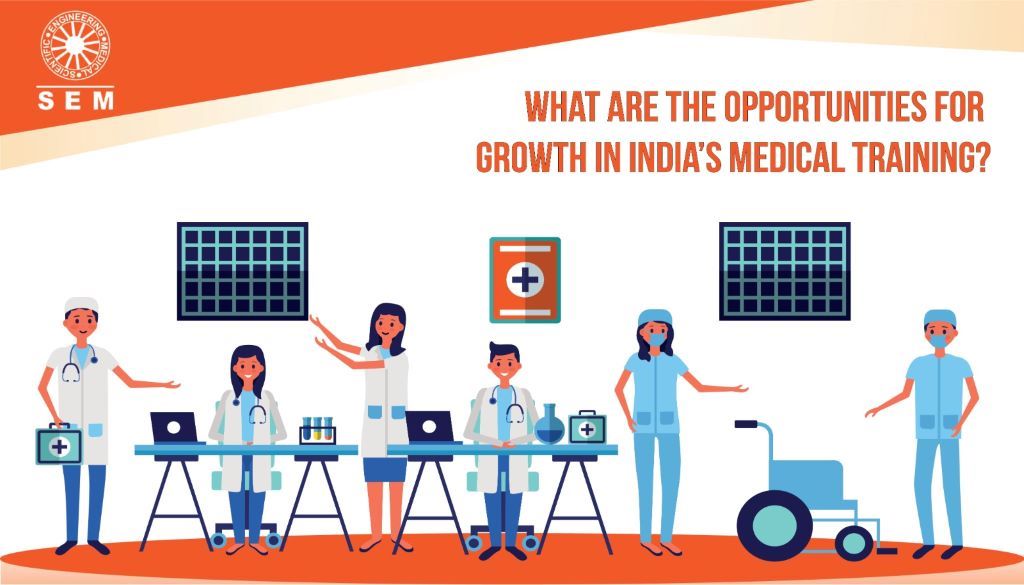What are the opportunities of growth in India’s Medical Training?

What are the opportunities of growth in India’s Medical Training?
India, known for its rich cultural heritage and booming economy, also possesses one of the most complex and expansive healthcare systems in the world. However, despite the remarkable advancements in medical science and technology, India’s medical training system still faces several critical challenges. Addressing these issues is paramount for improving the quality of healthcare and ensuring that medical professionals are well-prepared to meet the needs of the population.
Inadequate Infrastructure
One of the primary issues plaguing India’s medical training is the lack of adequate infrastructure. Many medical colleges and hospitals suffer from outdated equipment, insufficient classrooms, and limited access to modern teaching tools. This hinders the ability of medical students to gain hands-on experience and develop practical skills. For instance, in rural areas, medical students often have to rely on theoretical knowledge due to the unavailability of basic medical devices, let alone advanced simulation technology.
Shortage of Qualified Faculty
The shortage of qualified and experienced faculty members is another significant problem. Many medical colleges are understaffed, with a high student-to-teacher ratio that makes personalized instruction difficult. Faculty members are often overburdened, leading to a compromise in the quality of education. Moreover, there is a need for continuous professional development for educators to keep pace with the latest advancements in medical science and teaching methodologies.
Lack of Practical Exposure
Practical training is crucial in medical education, yet many institutions in India fall short in providing adequate hands-on experience. Clinical rotations, internships, and practical sessions are often limited, leaving students ill-prepared for real-world medical scenarios. This gap between theoretical knowledge and practical application can have serious implications for patient care and safety.
Outdated Curriculum
The medical curriculum in India is often criticized for being outdated and overly theoretical. While some strides have been made to update the syllabus, much of the content still fails to incorporate recent advancements in medical science and technology. There is also a need for greater emphasis on developing soft skills such as communication, empathy, and patient management, which are crucial for holistic medical care.
Limited Use of Technology
In an age where technology is revolutionizing every field, the integration of advanced technology in medical training in India remains limited. The use of digital tools, virtual reality, and simulation-based learning can greatly enhance the learning experience, yet many institutions lack the resources to implement these technologies. This limitation hampers the ability of students to practice complex medical procedures in a controlled and risk-free environment.
Insufficient Research Opportunities
Research is the backbone of medical advancements, yet Indian medical students often have limited opportunities to engage in meaningful research activities. There is a lack of funding, mentorship, and infrastructure to support research initiatives. Encouraging a culture of research and innovation is essential for the progress of medical science and for preparing students to contribute to global medical advancements.
That’s where SEM Trainers and Systems Steps in:
At SEM Trainers and Systems, we recognize these challenges and are committed to bridging the gap in medical training in India. We provide state-of-the-art medical manikins and simulators designed to offer realistic and hands-on training experiences. Our products are crafted to replicate real-life medical scenarios, allowing students to practice and hone their skills in a safe and controlled environment.
They are equipped with advanced features such as feedback systems, realistic anatomy, and scenario-based training modules. This technology not only enhances the learning experience but also ensures that medical professionals are better prepared to handle the complexities of real-life patient care.
By integrating our high-quality manikins and simulators into medical training programs, institutions can overcome the limitations of traditional teaching methods. Our solutions enable a more practical, immersive, and effective learning process, ultimately contributing to the development of highly skilled and competent medical professionals.
